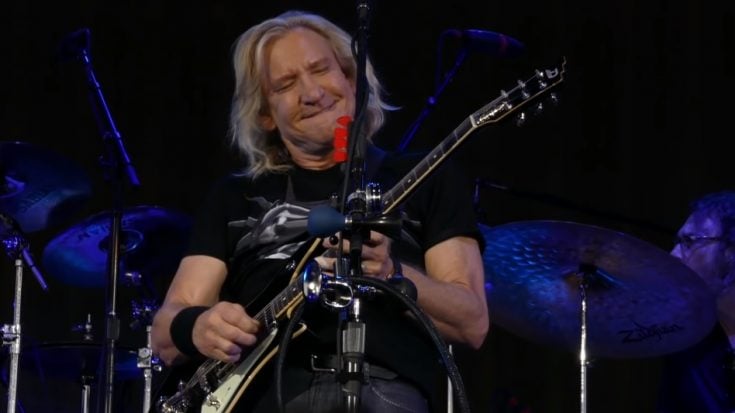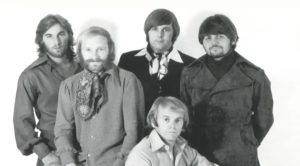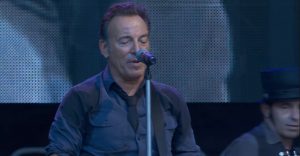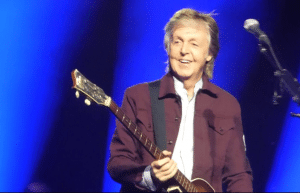How Joe Walsh’s Life Was Saved By Don Henley And Glenn Frey

Joe Walsh live in 2017 - datflys / Youtube
In 1975, when Cameron Crowe, the writer, featured Joe Walsh in Rolling Stone magazine, he hailed Joe as someone who “stands surely among rock and roll’s finest guitarists”. This commendation was entirely warranted, given that Joe had already earned the admiration of guitar legends like Eric Clapton and Jimmy Page.
This acclaim came before Walsh joined the Eagles and made hefty contributions to American pop culture with hits such as “Hotel California” and “Life in the Fast Lane”. The guitarist had once turned his back on the surging well-regarded trio James Gang, a hard rock band that achieved moderate success in the late 60s to early 70s.
But even the Clown Prince of Rock needed some help, especially during those days when drugs took hold of his life. Thank the rock gods his Eagle bandmates had his back.
“Right then is when I was hitting bottom, and I didn’t know how to stop. I was a mess,” Walsh told People in a November 2023 interview.
Hitting the rock bottom and redemption
Walsh recently opened up about a crucial turning point in his life when he faced the perilous depths of addiction. Reflecting on the band’s breakup, Walsh confessed that he struggled to cope and resorted to a lifestyle of constant partying.
In the interview, he candidly admitted, “I couldn’t process that [breakup], so I pretended they didn’t, and I just kept partying. Everybody in the ‘70s experimented with drugs. But I discovered that cocaine works good for me.”
The 1970s were rife with experimentation with drugs, and Walsh found solace in cocaine, using it as a means of self-medication to stay awake, compose songs, and exude a rebellious rock and roll attitude.
The intervention by Eagles
As Walsh continued down this destructive path, it was his bandmates, Don Henley and the late Glenn Frey, who intervened and ultimately saved him from a potentially tragic fate.
Recounting this pivotal moment, Walsh shared, “Right then is when I was hitting bottom, and I didn’t know how to stop. I was a mess. I said, ‘Well, I can get sober for that’.”
The ultimatum presented to him became a turning point, compelling him to confront his addiction and make a choice for sobriety.
Grateful for the intervention, Walsh revealed, “I was so relieved because I thought I was going to drown in a bathtub in some hotel alone somewhere like all my buddies had.”
Navigating his demons
Walsh’s struggle extended beyond drug addiction, encompassing battles with alcohol and mental health. Throughout his life, he grappled with ADHD and Asperger’s syndrome.
Alcohol initially provided relief, easing his nerves and allowing him to perform in front of an audience. However, this crutch soon became a hindrance, jeopardizing his career and relationships.
Facing rejection from collaborators, Walsh severed ties with alcohol. Similarly, his experimentation with drugs escalated after the Eagles’ breakup, leading to a realization that these substances were no longer a solution.
Rather than halting, Walsh found himself spiraling deeper into addiction before summoning the courage to confront and overcome it.
A very sudden breakup
Despite their subsequent reunions, the band’s breakup came as a shock to their fans. The catalyst for this separation occurred during the support tour for their sixth studio album, The Long Run, when an exchange between Alan Cranston and Don Felder left Glenn Frey frustrated, ultimately leading to the dissolution of the band.
In Frey’s account, the tension escalated during Cranston’s expression of gratitude to the other members, as Felder’s response to the thanks offended Frey and heightened the onstage tension. Following the completion of the set, Frey, in his own words, recognized the necessity of parting ways.
The discord extended beyond the night of the show. Following a conclusion marked by a smashed guitar, bassist Timothy Schmit contacted Frey the next day only to discover that the Eagles were calling it quits. And they did, only to once again converge after more than a decade.
After a much-needed 14-year hiatus, The Eagles made the decision to reunite and take another shot at performing, seemingly without heeding the lessons from their past mistakes. Their reunion primarily consisted of tours that likely brought back unfavorable memories.
A legacy marred by problematic reunions
In 2001, Henley and Frey ousted Felder, citing creative and personal differences, sparking a prolonged legal battle. Felder responded by filing three lawsuits against the band, alleging wrongful termination, breach of contract, and breach of fiduciary duty.
Essentially, Felder believed he was unjustly excluded from lucrative financial deals, asserting that Frey and Henley received disproportionately higher royalties for the songs without valid reasons.
In turn, Felder faced a counter-suit in relation to his upcoming book about the Eagles’ career, titled Heaven and Hell: My Life In the Eagles, the primary source of these narratives.
This saga underscores the toll that nine years of continuous touring can take on a band, turning friends into adversaries. Despite creating some of the finest music in American rock and roll history, The Eagles’ individual egos and reluctance to take a break ultimately contributed to their downfall as a band.











